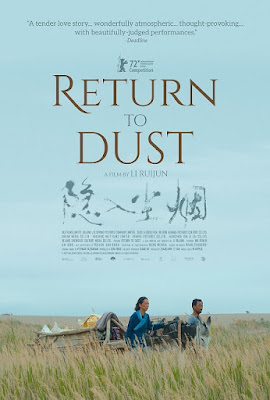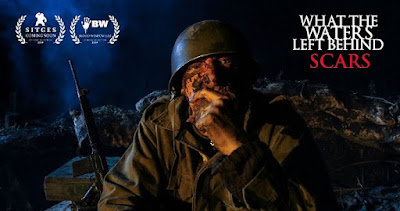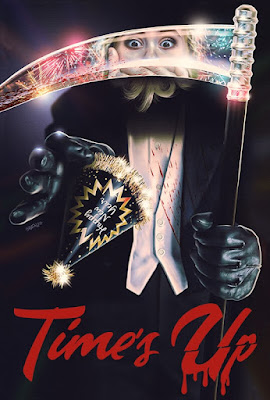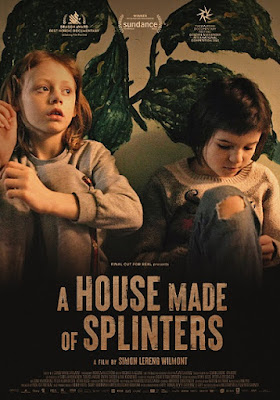Winny was sort of like a Japanese Napster, but it was originally envisioned
for more Wikileaks-style purposes. At least that was the defense offered by the
creator’s lawyers when he was put on trial for facilitating copyright
infringement. Technically, Isamu Kaneko is on-trial, but so is his creation in
Yusaku Matsumoto’s Winny, which screens as part of this year’s Japan Cuts Festival of New Japanese Film.
Kaneko
fits every programmer stereotype, making him a difficult defendant for the old
school judges to relate to, or understand. Fortunately, Toshimitsu Dan gets him
enough to formulate his defense, while also communicating persuasively. Dan
also has the benefit of Akita Masashi, his firm’s crafty senior partner, who is
serving as co-counsel.
Of
course, the naïve Kaneko makes things much more difficult for them, by signing
pre-written statements the Kyoto police assure him they he can change later. The
case is strange in many ways, since it focuses on Kaneko instead of those who
actually pirated copyrighted works. However, it is not lost on anyone that the
same police precinct is concurrently denying corruption charges prompted by
financial records distributed anonymously via Winny.
During
the trial, the word “proliferate” takes on great significance. In fact, these
court room scenes and all the trial prep are really crisply executed. Unfortunately,
Matsumoto and co-screenwriter Kentro Kishi never fully integrates the police
slush fund subplot with the rest of the film. It is a shame, because Yoshioka
Hidetaka is excellent portraying Senba, the police whistleblower.
It gave fans our first look at Boba Fett in action and we loved it. The
rest of the notorious Star Wars Holiday Special became a joke that
George Lucas tried to bury. Nevertheless, its legend lives on. Jeremy Coon and Steve
Kozak do not exactly rehabilitate the holiday special, but they help fans
appreciate the times and circumstances that gave rise to it in the documentary A
Disturbance in the Force, which had its international premiere at the 2023 Fantasia International Film Festival.
Ever
since it aired (for one-time only) in 1978, the holiday special has become
an easy Simpsons-style punch-line: “like The Star Wars Holiday
Special, ‘nuff said!” It is easy to see why. There is “comedy relief” from
Harvey Korman (in drag), Bea Arthur, and Art Carney. Plus, Diahann Carroll did a
Donna Summer-esque disco sex ode. Yet, everyone admits the original cartoon, “The
Faithful Wookie,” rendered in a style deliberately reminiscent of Moebius, was
pretty cool, especially because it included the very first in-world appearance
of Boba Fett. In fact, it is the only part of the special available on Disney+.
According to Jon Favreu, it even influenced The Mandalorian.
As
a young fan, I definitely remembered that cartoon and the design of Chewie’s Wookie
family home. The rest just went in one ear and out the other. Having seen the Donnie
& Marie Star Wars episode (which Donnie Osmond discusses at length in
the doc) and the Star Wars Muppet Show episode, I must have intuitively
understood this is just how late 1970s network TV treated a blockbuster sf
franchise, which is largely the point of Disturbance.
Coon
and Kozak talk to a lot people involved in the making of the special, including
Steve Binder, who also directed the Elvis Comeback Special. Since this
was the pre-VCR era, Lucas and the studio worried fans might forget the first
film, which is why the original cast started appearing on variety shows, before
filming the special. Apparently, there was a bit a power struggle between the
Lucas camp and the network camp, but as the troubled production dragged on,
more and more Lucas people were replaced by network veterans.
Even though they had Godzilla and Gatchaman, Star Wars still blew the
minds of Japanese science fiction fans when it opened in 1978 (in Japan). That
is especially true for Hiroshi. He aspires to remake Star Wars for his
high school arts festival, but the project evolves into something more original
and more personal in Kazuya Konaka’s Single8, which screens today as
part of this year’s Japan Cuts Festival of New Japanese Film.
Hiroshi’s
first film was a Jaws “homage” called Claws that technically
pre-dated Grizzly, but he still finds it embarrassingly amateurish by
his current standards. He has been obsessively trying to recreate the opening Imperial
Destroyer scene in Star Wars—notice how nobody calls it “A New Hope” in
1978—with the help of his pal Yoshio. Since nobody has a better idea, they pitch
their remake to their class, for the school’s arts festival. Their teacher, Mr.
Maruyama, is reasonably receptive, but he encourages them to create their own
story, with a message that will speak to their classmates.
With
input from Sasaki, another fannish classmate, they brainstorm the plot of Time
Reverse, in which aliens alarmed by Earthlings’ destructive tendencies make
time run backwards, so humanity can fix its mistakes. The only two people
unaffected are a teen couple, whose relationship is on the rocks. For Hiroshi,
the greatest advantage of their new story is that his longtime crush Natsumi
might be interested in playing the female lead.
Although
Hiroshi and his friends are initially motivated by their Star Wars love,
Single8 (Japan’s equivalent to Super8) has far fewer references than
Patrick Read Johnson’s 5-25-77. It is also considerably livelier and
much less whiny. Frankly, a better comparison film would be the original One Cut of the Dead, because both films are such affectionate tributes to the filmmaking
process.
Oda Nobunaga's wife Nohime did not think much of him at first, but she
became his Lady Macbeth, driving his ambitions, before settling into an Eleanor
Roosevelt role as a trusted advisor. At least that is how a new film commissioned
to celebrate the Toei film studio’s 70th anniversary presents her.
The mysterious Nohime finally gets equal screentime with her legendary husband
in Keishi Otomo’s The Legend & Butterfly, which screens tomorrow as
part of this year’s Japan Cuts Festival of New Japanese Film.
Nobunaga
and Nohime only married to make peace between their clans. The courtship was
rocky, to say the least. Nohime only agreed, because she intended to kill him, just
like her previous husbands. However, she must accept his protection when her
clan is attacked. Of course, Nohime wants revenge, but she pushes Nobunaga to
take more when he emerges as one of the most powerful Daimyo in Japan.
For
a while, L&B is like a Chanbara Mr. & Mrs. Smith, because
they are both serious butt-kickers, especially her. However, as the film takes
on epic scale, Nobunaga becomes the more prominent force. Yet, their
relationship also continues to evolve, and in some ways, deepen.
Considering
how little was documented on Nohime’s life, beyond her status as Nobunaga’s
wife, screenwriter Ryota Kosawa’s speculative attempts to fill-in the blanks
are quite convincing. He creates a compelling character, whom Haruka Ayase
brings to life quite vividly. By far, she is the most compelling figure in the
film. Kosawa and Otomo definitely present her from a modern, pseudo-feminist
perspective, but Ayase makes her credible as a woman of her era and relatable to
contemporary viewers. She also looks impressive during her several action
sequences.
If you can’t laugh at family, who can you laugh at? Of course, they still
have to be funny. The Phams are very hit-or-miss when it comes to comedy, but
boy do they try hard to bring the yuck-yucks. There is a lot of running around
and complaining in their suburban Canadian neighborhood, but each problem is
resolved in about twenty-two minutes by the diverse cast in creators Andrew
Phung & Scott Townsend’s Run the Burbs, which premieres Monday on
the CW.
Run
the Burbs is
shot in Ontario, but it is based on Phung’s Calgary suburb. Wherever it is, it
is definitely Canadian, which is what we are coming to expect from CW shows,
especially during the writers and actors strikes. Phung plays Andrew Pham, a
stay-at-home dad, who raises his abrasively woke teen daughter Khia and geeky
pre-teen son Leo, while his wife Camille makes money doing her “entrepreneurial”
thing. Of course, Khia has some sort of trendy alphabet sexuality, so they can
avoid the trouble of writing a complex persona for her.
There
are times when the writing appears poised to make sharp satirical commentary,
but it always backs off at the last minute. For instance, in the pilot episode “Blockbuster,”
the neighborhood block-party is in danger of cancellation, by the officious
paper-work-obsessed community-association president, but it down-shifts into a
cheesy Fast & Furious parody (in which Camille takes on a
street-racer for his party permit) rather than seriously skewering the buzzkill that
is bureaucracy.
Likewise,
“Heatwave” sees Khia accept a mural commission at their favorite bubble tea store,
only to squander it with a highly politicized and massively inappropriate monstrosity.
It is a great set-up to skewer the woke mentality, but the toothless follow-up
mostly consists of some apathetic shrugs.
Kenji Miyazawa was poorly served by his publishers in his lifetime, but anime
and manga adaptations made him a posthumous giant of Japanese literature. His
life was tragically short, but his father believed in his talent, at least most
of the time. The Miyazawas’ close but sometimes difficult father-and-son relationship
is the focus of Izuru Narushima’s Father of the Milky Way Railroad,
which screens tomorrow as part of this year’s Japan Cuts Festival of New Japanese Film.
Masujiro
Miyazawa is a reasonably prosperous country pawnbroker, like his grouchier
father. He considers himself a contemporary man of the late Meiji Era, but Masujiro
still assumes his firstborn son will succeed him in the family business.
However, as Kenji grows older and more headstrong, he envisions other destinies
for himself, including as an agricultural expert and as acolyte in a severe
Buddhist sect.
Of
course, writing was his true calling, but it takes a family tragedy to
re-awaken his fantastical creativity. Throughout it all, Miyazawa’s father
continues to support him, despite often losing patience in his flaky behavior.
In
fact, their relationship is surprisingly believable. There is a lot of
tear-jerking in Narushima’s film, but he and the cast earn their big emotional
pay-offs. Sadly, this is the kind of deeply felt family drama the American film
industry cannot be bothered with anymore. There is no secret abuse to expose or
power dynamics to subvert. It is just a family, relatively progressive for its
time, dealing with the challenges and disappointments of life.
In the mid-1990s, Ebay became the place for collectors. Everyone who was
buying LPs largely have seen their purchases hold their value, because the
music in the grooves has intrinsic value. That has not been the case for Beanie
Baby collectors. Crypto cannot compare, yet, to the boom and bust of the little
“under-stuffed” plushies. Directors Kristin Gore and Damian Kulash show how it
happened from the perspective of three women who had the mixed fortune to be
close to the company founder in The Beanie Bubble, which premieres today
on Apple TV+.
Ty
Warner sort of had the original vision for more “posable” stuffed animals, but
he was also a manipulative user. At least that is the conclusion his former “partner,”
“Robbie” (based on Patricia Roche) comes to. For a while, he manages to replace
her with Maya Kumar (transparently modeled on Lina Triveti), who literally
joined the company as an intern answering the phones. However, she had an
inkling of the potential for internet marketing way before it was a standard
thing.
Kumar
also has the brilliant idea to play up the limited nature of the mini-sized
plushies. Fortuitously, some of Warner’s designs were starting to catch on,
especially those he developed with input from the woman he is romancing and her
two daughters. In fact, from Sheila’s perspective (sort of Faith McGowan), her
girls did most of the work. However, he sufficiently dazzles them with extravagant
gifts, so they do not think about things like rights or credits.
Beanie
Bubble is
much like Matt Johnson’s BlackBerry, in that both persuasively and
dramatically show what each company did right and what they did wrong (though BlackBerry
is definitely the superior film). On the other hand, Beanie Bubble is a far
more entertaining and more up-tempo viewing experience than the HBO doc Beanie
Mania. Regardless, it is fascinating to see how the Ty company rode the
original internet wave. Yet, it so conspicuously stacks the deck against
Warren, it cries out for an epilogue from his perspective, to give some sense
of balance.
Gore
and Kulash constantly flash backwards and forwards, for the sake of being hip
and stylish. They always immediately identify the year, so it is confusing, but
it sometimes fractures the flow. However, it is certainly an aptly colorful
production, suiting its subject.
The humble pencil is a symbol of freedom. It is an instrument of a free
press and Milton Freidman famously used it to illustrate the benefits of a market
economy and the division of labor. He is right, no one person can make a
pencil, but there is a grim looking pencil factory in the Russian Karelian
village Antonina Zolotareva moves to, in order to be closer to her imprisoned activist
husband. Zolotareva is no Jaime Escalante, but she is the most conscientious
teacher her new students have ever had in Natalya Nazarova’s The Pencil,
which premieres today on OVID.tv.
Zolotareva’s
husband was a prominent artist, whose work often criticized the Putin regime
(maybe that part is not explicitly stated, but it is clearly implied). Unfortunately,
it is all too evident during Zolotareva’s first visit, his spirit has been broken.
Nevertheless, she has already committed to living in the nearby industrial
town. She too is a trained artist, so she obtains employment at the local
under-staffed public school.
Much
to her surprise, some of Zolotareva’s students have talent, but the school
bully, Misha Ponomarev, does his best to disrupt her classes. Since his brother
is a local gangster soon to be released from prison, most of Zolotareva’s
colleagues turn a blind eye to his thuggery. Perhaps foolhardily, Zolotareva
challenges Ponomarev’s authority, so he responds with greater violence,
particularly against the under-sized Dima Demkin, her most promising pupil.
As
a side note, I will no longer cover commercial releases from China, Hong Kong,
or Russia, because the established film industries have been so thoroughly
compromised by the CCP and Putin regimes. That clearly does not apply to this
film. It might have had a domestic Russian theatrical release, but it paints a
very different picture that what RT propaganda projects. In fact, it depicts
a profoundly corrupt society, in which people regularly ignore the violence around
them. Watching The Pencil, it is easy to understand why so many Russians
blandly accepted Putin’s invasion of Ukraine.
If you have read your Hawthorne, you should be wary of a house with many
gables. Parker certainly should have, being a writer. Instead, he and his wife
are initially charmed by all the old love letters they find hidden inside. That
also should have rung some alarm bells too, but they don’t suspect the
supernatural until it is too late in screenwriter-director Greg Pritkin’s The
Mistress, which releases tomorrow in theaters and on VOD.
At
first, Parker and Madeline are thrilled with their new Queen Anne house (mostly
bought by her, because, you know, he’s a writer). They think the old plate
camera they find is charming and the former occupant’s love letters fascinate
them. They remain oblivious even when a friend suffers a freak accident. Then
Parker starts seeing a mystery woman in the house. Initially, he assumes it is
his old stalker, but she reveals herself to be the spirit Rebecca, who committed
suicide in the house a century prior, after her married lover rejected her.
The
Mistress has
some nice bespoke period trappings, like the plate photographs and love
letters, but Pritkin’s basic narrative is very familiar stuff. Most horror fans
have seen the same before, but oftentimes better.
Still,
there are several nice touches. Parker listens to Blue Note-era Herbie Hancock,
which is something. It is also pretty mind-blowing to see Rae Dawn Chong
playing Madeline’s mom—and she is good, as fans would expect.
Evidently, Travolta had it easy in Face/Off. His mind-body swap was with Nic
Cage, who was crazy, but not nearly as sinister as this Korean serial killer. Det.
Choi Jae-hwan had been pursuing Cha Jin-hyuk, until he wakes up inside the
psycho’s body. It is obviously inconvenient, but there are also potential
advantages when it comes to catching Cha’s accomplices in Kim Jae-hoon’s Devils,
which had its North American premiere at the 2023 Fantasia International FilmFestival.
Cha
is the leader of a band of dark-web snuff film sickos, so yes, he is really
bad. They have long eluded Choi, even killing brother-in-law, a fellow cop, during
the prologue. Choi wants him bad, so he pursues him at all costs when they
receive an anonymous tip. However, both Choi and Cha disappear into the forest,
leaving the cop’s protégé-partner Det. Kim Min-sung completely baffled.
A
month later, they mysteriously re-appear. The man who looks like Choi claims to
have no memory of the last few weeks, whereas the man who looks like Cha wakes
up in the hospital, knowing he is in fact Choi. He also realizes his family is
in serious danger from his nemesis.
It
all sounds like Face/Off, but its not. Devils turns out to be
much more sinister and devious, but the big secret holds up incredibly well, at
least by high-concept thriller standards. Arguably, Devils turns out to
be more believable than that John Woo film it so readily brings to mind.
Do you miss the joy of basketball, before the NBA became consumed with the
pursuit of money from China? Ryota Miyagi and his teammates do not necessarily
like each other, but they play with a pure love for the game. Despite their talent,
nobody gives Okinawan students much of a chance against the defending Japanese
high school champions, not even their fans, in Takehiko Inoue’s The First Slam
Dunk, an animated adaptation of his manga, which screens as the opening
night film of the 2023 Japan Cuts Festival of New Japanese Film.
As
we see in flashbacks, Miyagi idolized his older brother Sota, who was one of
the top basketball prospects in Japan. Tragically, Sota was lost in a boating
accident, devastating Ryota. As a tribute to his older brother, Miyagi
obsessively pursues his hoop dreams, even though his single mother has her reservations
regarding the emotional toll.
Throughout
their game against Sannoh, Miyagi keeps flashing back to memories of his
brother. He also revisits some of his first encounters with his Shohoku teammates,
like their outside shooter, who was once a bully, but Miyagi won him over, by
taking his worst beating like a man.
Miyagi
is quick, but undersized, so he struggles against Sannoh’s press. Their big man
also gets into the head of Shohoku’s center. However, Miyagi’s Zen-like coach
has faith and a knack for making the right moves.
In the future, you still must pay your taxes. Death is a different matter—depending
on the circumstances. A quasi-government agency can resurrect anyone who dies
an untimely death, as long as they digitally backed themselves up within the
last forty-eight hours. Legally, they cannot use a file more than two days old.
There are practical scientific reasons for that, but they will be violated
anyway in Robert Hloz’s Restore Point, which had its world premiere at
this year’s Fantasia International Film Festival.
Nobody
dies, if they take reasonable precautions. However, there are those who feel taking
so much risk out of life devalues the experience of living, somewhat like in Tony
Aloupis’s better-than-you-might-think I am Mortal. Police detective Em
Trochinowska has a bone to pick with them, particularly the terrorist group
River of Life. They killed her husband, after holding him past the forty-eight-hour
mark.
Apparently,
they also just murdered the scientific director of Restore Point, David
Kurlstat, and his wife, after sabotaging their back-ups. However, Trochinowska unexpectedly
gets the benefit of Kurlstat’s technical expertise when she discovers Restore
Point illegally revived the scientist with a six-month-old bootleg. Unfortunately,
there is a bit of a mind-body disconnect, which makes the new imperfect copy
twitchy and nauseous.
It
has been a while since there was a new Czech science fiction film, even though
the Czechoslovakian film industry released many moody sf classics in the 1950s
and 1960s, such as Ikarie XB-1. In some ways, the dystopian Restore
Point very much feels like a throwback to that era. Hloz’s future urbanscape
is particularly impressive, taking design-inspiration from the real-life
postmodern structures of Shanghai and Dubai.
During times of war, a good internet connection can pass on valuable intelligence
and document war crimes for the world to see. Katya had something like the
latter in mind when she volunteered her tech savviness to the cause of Ukraine’s
defense, but she becomes determined to reunite the former owner of her used
laptop with his young son in Yelna Strelnikova’s Stay Online which
world-premiered at the 2023 Fantasia International Film Festival.
Apparently,
there is still some life in the “Screenlife” concept of films like Timur
Bekmambetov’s Profile and Aneesh Chaganty’s Searching. The minimal
set requirements helped facilitate the film’s production—billed as the first
feature initiated and completed since Putin invaded. Putin also supplied the realistic
war conditions seen throughout the film.
Katya
is struggling to find a suitable way to respond to the war raging around her.
Her brother Vitya is an armed volunteer with the defense forces, while her
American friend Ryan does humanitarian work in the field. They each want Katya
join their respective efforts, but she would rather share demoralizing information
on KIA Russian soldiers with their uninformed loved ones back in Russian.
She
also does some IT kind of work for Vitya’s unit, installing GPS tracking
software on donated laptops. Much to her surprise, she gets a Telegram message
from Sava, the young son of the laptop she is now working on. With the help of Vitya
and Ryan, she tries to track down his missing parents.
Viewers
need to steel themselves, because Strelnikova’s depiction of war is tragically
realistic. Bad things happen to good people, early and often. Arguably, Stay
Online is the most believable Screenlife movie yet, because a happy ending
is never guaranteed. It is also the most immersive Screenlife film, embedding
viewers into the war-zone, through FaceTime footage and the like, which is how
we have grown accustomed to witnessing combat.
According
to IMDb, Stay Online is Liza Zaitseva’s only screen credit to date, but
she is devastatingly convincing as Katya. It might have been partly a case of
involuntary method acting, given the war literally erupting around her. Yet,
she also expresses Katya’s grief and pain with visceral power. Viewers who do
not share her feelings must be dead inside.
Let this film be a lesson. Keep your car doors locked and your windows
rolled up. I have seen smart phones snatched out cars in traffic on the streets
of Rio, but the prospect of getting carjacked by Nic Cage is even worse. At
least it makes for an interesting ride in Yuval Adler’s Sympathy for the
Devil, which opens in theaters this Friday, after world-premiering at this
year’s Fantasia.
The
driver just wants to park, so he can rush to join his wife, currently
undergoing labor. Unfortunately, the armed “passenger” who jumps in his back
seat has other ideas. Apparently, he wants to take the driver out to a remote
desert air field for some sort of underworld reckoning. It is all totally
baffling to the driver, who steadfastly insists his name is David Chamberlain,
even though the Passenger is convinced he is someone else.
It
will be a proverbially bumpy night, especially when the Passenger shows his
willingness to kill anyone interrupting his cat-and-mouse game. The premise is
fairly simple, but the absolutely maniacal Nic Cage elevates it to nearly the
level of high art.
Indeed,
Adler shrewdly showcases the Cage Rage, trusting in its inherent appeal. Wisely,
Joel Kinnaman stays out of his way, opting for an understated slow burn
opposite the deranged Cage. Of course, any savvy film patron can guess the
answer to the is-he-or-isn’t-he “mystery,” but the gritty duo still keeps us
hooked.
When it comes to rebooting established franchises, the Japanese film industry
is much smarter than Hollywood. Just look at the “Shins,” or the “Shin Japan
Heroes Universe” movies: Shin Godzilla and Shin Ultraman. They
are all true to the spirit of the originals, but the effects have been
modernized—and pretty much only the effects (although Shin Godzilla also
savaged the supposed professionalism of government bureaucrats). Fans of the
long-running motorcycle tokusatsu TV series might be surprised by the return to
manga level of violence, but they will feel right at home with the rest of Hideaki
Anno’s Shin Kamen Rider (or Shin Masked Rider), which screened at
the 2023 Fantasia International Film Festival.
Poor
innocent biker Takeshi Hongo was kidnapped by SHOCKER (a KAOS or THRUSH-like
organization), who turned him into a grasshopper hybrid super-being. Ominously,
they intend to use the augmented hybrids (“Augs”) like him to destroy humanity,
because that will make Augs like them happy. In the long-run, they also think
it is in our own best interest, since we are such a miserable species. Ruriko
Midorikawa and her scientist father broke from SHOCKER, taking Hongo with them,
so he can fight to save humanity. It is a family affair, since SHOCKER will be
led by Ichiro Midorikawa, a butterfly-Aug, once he wakens from his cocoon.
Much
to the mild mannered Hongo’s surprise, he can hardly control his killer
instincts when he is suited up and using his Prana-fueled powers (prana being the
rough equivalent of Chi in the Shin universe). In contrast, Ruriko
Midorikawa is much more calculating and cold-blooded, but her powers are mostly
those of the mental kind. She always prepares. Unfortunately, their only allies
are the Anti-SHOCKER government agency, who are not particularly trust-worthy.
With
all its stunt-driving, Shin Kamen Rider is sort of like a cross between Ultraman
and Fast & Furious. While it is not as strong as the previous Shin
films, it at least manages to tell an entirely self-contained story in a
smidge over two hours, which is more than Fast X can say for itself.
In
terms of effects, the Shin-inized Kamen Rider represents a major
upgrade from the early 1970s cult classic. Sosuke Ikematsu and Minami Hamabe
are also very strong as the brooding Hongo and the detached and analytical
Midorikawa. Mirai Moriyama is pretty creepy as Ichiro Midorikawa, but the most
memorable villain is Spider-Aug, the first that Hongo fights.
In Canada, this show is sort of like Everyone Hates Chris or Young
Rock. Since comedian Mark Critch is not particularly well-known in America,
we can think of it as The Wonder Years with some Rush songs. Coming of
age is always hard, especially with an embarrassing family, but young Mark
Critch learns nearly everyone has an embarrassing family in Son of a Critch,
which premieres Monday on the CW.
The
Critch family lives on the outskirts of late-1980’s St. John’s, Newfoundland.
His father Mike (played by grown-up Mark Critch, who also narrates, like Daniel
Stern on The Wonder Years) is a gung-ho reporter for the local radio
station and his somewhat high-strung mother Mary boils all their food. Perhaps
his moody teen brother Mike Jr. is his least embarrassing family member.
However, sharing a bedroom with his crotchety grandfather Peter (“Pops”) is
definitely way up there, even though he is probably closer to Pops than his
parents or brother. Attending wakes to grade the food is one of their favorite things
to do together.
Regardless,
the best parts of Critch happen at the Catholic junior high school young
Mark is forced to attend. To say the Dean Martin-listening Critch is socially
awkward is an understatement, but he manages to befriend Ritchie Perez, the son
of successful Filipino doctors. Unfortunately, he is quickly bullied by “Fox,” one
of three thuggish red-haired siblings all known by their surname. She also has
a massive crush on Critch, which he reciprocates, even though he will not admit
it.
Based
on the first four episodes, young Critch’s relationships with Perez and Fox are
the best things going for the series. His rapport with grouchy grandpa is also
very likable, especially since the old dude is played by the legendary Malcolm
McDowell (try to forget how many times we have seen him naked in films like A
Clockwork Orange and Cat People). Listening to him kvetch with
Benjamin Evan Ainsworth, the young Mark Critch, is pretty amusing, particularly
in the funeral-focused second episode, “Lordy, Lordy, Look Who’s Dead.”
The
”Pilot” episode truly feels like a pilot, since it is literally Critch’s first
day of school. Still, the third act shows some of the chemistry developing
between Ainsworth and Sophia Powers and Mark Ezekiel Rivera as Fox and Perez. That
is where the charm and humor of the third and fourth episodes (“Cello, I Must
Be Going” and “Cucumber Slumber”) come from. That said, the digs at Catholic
school life and the portrayal of the nuns are mostly cliched and derivative
material.
Usually, is great news when an indie release becomes a sleeper hit. However,
it got Li Ruijun’s hardscrabble film banned in China. Obviously, it is banned,
since it disappeared from theaters and streaming platforms, but there was no
formal explanation issued. It is not like you can ask these questions on
Chinese social media either. Perhaps the better question is how did Li’s
searing portrait of rural Chinese poverty and societal indifference ever get
approved in the first place? Life is bleak in Gansu (on the outskirts of the Gobi
Desert), as depicted in Return to Dust, which opens today in Brooklyn.
Ma
Youtie is a humble man, who is not comfortable with people. It is just as well,
considering how contemptuously his surviving younger brother treats him. Much
to his surprise, his disinterested family arranges his marriage to the disabled
and much abused Cao Guiying, largely so they can both be rid of them. They do
not have much choice in the matter, but they develop a supportive and
eventually loving relationship together, as they eke out a subsistence
dirt-farming living.
Ma
and Cao get no support from their families, so they essentially squat in
abandoned farm houses. Unfortunately, the provincial government has launched a
program to raze such derelict buildings, much like in Detroit. Ma also
literally has his blood sucked dry by the local oligarch, with whom he shares a
rare blood-type.
To
satisfy the censors for the film’s original release, Li tacked on an unconvincing
epilogue that bizarrely contradicts all the exploitation Ma and Cao endured and
the callous disregard of their community that viewers just spent over two hours
watching. This is a withering indictment of contemporary Mainland society, but
Li’s pacing is decidedly deliberate. It is easy to imagine CCP censors starting
the film and skipping ahead to the end, thereby missing the totality of the
couple’s Job-like suffering.
This
is not a charming little slice-of-life film, which makes its grassroots
breakthrough in China so surprising. It can be a tough go, but it is keenly
sensitive to its main characters’ trials and travails. Wu Renlin (Li’s uncle)
is an amazingly intuitive and expressive thesp. Technically, he is not a “professional”
actor, but this Li’s third film he has appeared in. The dignity and the sorrow
he conveys are absolutely devastating. Likewise, Hai Qing (a major star,
primarily in TV, but also from films like Sacrifice) will quietly
destroy viewers as Cao.
Don't go to Barbie. Watch the second season of this Philippines-set cop show
instead. Yes, they are vastly different, particularly in terms of their ethical bearings.
Barbie features a child-like rendering of China’s imperialistic “Nine-Dash Line,” which asserts their illegal claims to the waters and fishing rights of
the South China Sea, way beyond its borders. The studio claims their prop map
just coincidentally resembles the CCP’s notorious Nine-Dash Line, but has there
ever been a film that lavished greater attention on its art direction and
design details than Barbie?
In contrast, the third episode of Almost
Paradise’s second season directly addresses the dire economic hardships
experienced by Filipino fisherman as the result of China’s naval imperialism.
There are also ten new crimes for the somewhat unlikely trio of detectives to
solve in season two of creators Dean Devlin & Gary Rosen’s Almost
Paradise, which premieres today on Freevee.
If
Almost Paradise sounds vaguely familiar, season one premiered on WGN,
back in 2020. Now, it is a Freevee, show, but little else has changed, except
Alex Walker’s formerly high blood pressure. For health reasons, he retired from
the DEA and moved to Cebu, where he had fond memories from his first case. He
actually got healthier, despite working several cases with Mactan detectives
Kai Mendoza and Ernesto Alamares, sometimes reluctantly and sometimes through
his unwelcome initiative. Their boss, politically savvy (but not corrupt) Chief
Ike Ocampo is always eager for the benefits of Walker’s DEA experience—and contacts.
The ambitious Mendoza and the Zen-like Alamares are impressive, whereas Walker
is grizzled and burned-out, but his new Filipino friends steadily rejuvenate his
soul.
Almost
Paradise
is a very traditional throwback-style of detective show, in that all ten
episodes of season two can easily stand alone. There is a recurring villain, Vargas
“The Water-Boarder,” a drug lord Walker busted in the first season, but each
episode has its own self-contained arc. In terms of theme and tone, the series
should appeal to fans of Lenkov-verse shows like Magnum P.I. and Hawaii
Five-O, but it also incorporates Filipino and Cebuano culture in smart,
interesting ways.
The
first episode, “The Magellan Cross,” refers to a relic of early colonial times,
but it might be the weakest of the season, so keep going. “Breaking Badminton”
is indeed set in a dodgy badminton club, which is about as Philippines as it
gets. “A Fishfolk Tale” calls out the Chinese maritime grab by name, while
showing how the resulting hardships exacerbated tensions between two clans of
fishing families.
“Ghost
Month” (S2E6) might be the best episode, exploring local belief in “hungry
ghosts,” without completely undermining the supernatural themes with a pat “Scooby
Doo” ending. “All In” is a clever caperish installment, wherein Walker agrees
to test the security of a luxury casino owned by Ann Villegas, the heiress he
is trying to romance, while “Uncoupled” handles some creepy cult stuff pretty
well within its forty-some-minute time constraints, when Walker and Mendoza go
undercover in a New Age couples retreat.
It all goes back to Jaws, the movie that changed everything. It even
has its own behind-the-scenes Broadway play opening soon (unless there is yet
another strike). The idea of a summer “blockbuster” as we know it started with
its release. On the other side of the spectrum, Jaws also inspired a
whole school of cheap knock-offs. This documentary is all about the knock-offs.
Filmmakers and critics celebrate shark cinema in Stephen Scarlata’s Sharksploitation,
which premieres tomorrow on Shudder.
From
time to time, you saw sharks in movies before Jaws, particularly as the
pets and executioners of Bond villains. Obviously, the Spielberg classic took them
to a whole new level. Naturally, there is analysis of all three sequels, but a
lot of viewers might wish for more dish on the notorious Jaws 4: The Revenge.
Weirdly, it is almost like nobody who was in the film wants to talk about it
anymore.
Scarlata’s
coverage of Jaws 2 gives the first sequel some of the credit it
deserves. It really is a great film, but it gets unfairly lumped in with the next
two sequels, which were dreadful. (However, it is hard to believe Murray Hamilton
could still be the mayor. Honestly, Bill de Blasio must be the only other mayor
who did more damage to his town.) It is also important to remember “just when
you thought it was safe to go back in the water” was the constantly quoted tagline
for Jaws 2.
Scarlata
and company survey shark-specific imitators, as well as other sea predator
rip-offs, like Joe Dante’s Roger Corman-produced Piranha (both of whom
off on-camera commentary). There is coverage of reasonably presentable films
like Orca, Open Water, and 47 Meters Down. Unfortunately, the
French film Year of the Shark might have been too recent and not widely
enough screened to make the cut, but there is a good hard look at The Last
Shark, an Italian copy-cat that was so shamelessly derivative, Universal
successfully blocked its release. Of course, no films were more exploitative
than the Sharknado franchise.
In horror movies, when somebody hears a noise that other people say they
can’t, it is a sure bet someone is getting gaslit. Whether the scratching and
voices Peter hears are real or not might not be immediately clear, but it is
safe to conclude his parents are horrible. Unfortunately, they might not be the
only bullies and monsters he must contend with in Samuel Bodin’s Cobweb,
which opens Friday in New York.
Basically,
poor Peter is bullied at school and terrorized at home. Lately, he has been plagued
with nightmares and unnerved by noises coming from within the walls of his
room. At first, his parents tell him he is just making it up, but eventually
his dad Mark breaks out some rat poison, so he can act even creepier.
Just
about the only person who shows any genuine concern for Peter is new teacher
Miss Devine (a long-term substitute) who appreciates his sensitivity and
recognizes the warning signs of abuse. However, the principal counsels Devine to
stay aloof, while the voice in Peter’s walls offers dangerous advice.
Supposedly,
Cobweb (not a very descriptive or apt title) was partly inspired by Poe’s
“The Tell-Tale Heart,” but the film has a very different vibe, since Bodin and
screenwriter Chris Thomas Devlin clearly suggest there is something more
monstrous afoot than a psychotic unreliable narrator. In fact, there is—sort of—but
it is also extremely exploitative.
Regardless,
Lizzy Caplan and Anthony Starr are so deranged as Peter’s parents, they could
give Nic Cage (in Mom and Dad) a run for his money. Frankly, Caplan’s
big meltdown scene might even out-Cage-rage the master.
Usually, rural folk are more respectful of veterans. Creepy Perry thinks his
attitude is okay, because he considers himself a vet too, but Tess can tell he
never saw a day of combat. She is the real deal, so Perry should have given her
a wide berth. Instead, he and a few friends lay siege to her parents’ country
home, looking for a cache of drug money in Neil LaBute’s Fear the Night,
which releases this Friday in theaters and on VOD.
Nobody
in the family had been to their parents’ old place in years, but Tess’s judgy
sister Beth still wanted to have their little sister Rose’s bachelorette party
for there anyway. When they stop at the general store, Perry and his
knuckle-dragging sidekicks try to hassle the ladies, but Tess is having none of
it. When they get to the house, the care-takers seem a little dodgy. So much so,
Tess starts snooping around their cottage, overhearing some of their drug
business as a result.
When
night falls, Perry and his goons start shooting arrows into the house. Tess isn’t
sure whether the “caretakers” are with them or not. It is pretty clear Tess is
the only one the bachelorette party can count on, even though they have been
whining and snarking at her all night.
You
would never know from the pedestrian look and vibe of Fear the Night that
LaBute was once considered a major voice in drama and independent cinema. Then
the Nic Cage Wicker Man remake happened. This is generally watchable,
largely thanks to Maggie Q, who is a highly credible action star. However,
LaBute never cranks up the violence enough for fans of home invasion-revenge
horror and his gender warfare dialogue lacks the bite of his 1990s
career-defining work.
Grab a warm cup of Nongshim noodles and start meowing for no reason. Seriously,
there is no logical reason people make cat noises before Fantasia screenings
start, but by now, it is a tradition. They also have a tradition of screening
some of the most distinctive genre, cult, animated, and Asian films around.
There will be plenty of films to look forward to when the 2023 Fantasia International Film Festival opens this Thursday evening.
Usually,
Fantasia films are fun, which would seem to preclude anything depicting Putin’s
illegal invasion of Ukraine, but the backdrop of war makes a tense but fitting
setting for Yeva Strelnikova’s Stay Online. The first Ukrainian feature
produced since the invasion commenced, it uses the “Screenlife” techniques of
Aneesh Chaganty’s Searching and Timur Bekmembetov’s Profile.
Considering
how compromised the Russian and Chinese film industries have been by their
respective regimes, I no longer review any films their censors approve for
release. However, Victor Ginzburg’s Empire V holds the (happy?)
distinction of being banned by the Russian Ministry of Culture for its thinly
veiled satire of Putin’s oligarchs.
According
to the description, Robert Hloz’s Restore Point is the first Czech
science fiction in forty years, which is saying something. Fantasia is also
programming a mini-four film retrospective of Juraj Herz’s dark cult classics
(but not Cremator, maybe because it is too obvious).
South
Korea has produced some of the best thrillers of the last fifteen years,
especially historical thrillers, so Lee Hae-young’s Phantom looks like a
solid bet.
Sadly,
Nicolas Cage was supposed to be a special guest of the festival for Sympathy
for the Devil. Sadly, the actor’s strike ruined that for festival patrons,
but they are still screening his film.
Plus, there is even a
one-minute experimental Art Blakey short, “Visions of Blakey,” as well as many more
films ripe for discovery at this year’s eagerly awaited, live and in-person
Fantasia International Film Festival.
The Ravens are such a dumb hardcore band, they don’t get the Damon Knight (“To
Serve Man”) joke when a fan promises “my folks are having barbecue—they would
love to have you.” Unwisely, they drive her into the ruins of Epecuen, the
flooded Argentine resort city that remains in complete ruins. Just like in the
previous film, the Ravens fall prey to a grotesque Texas Chainsaw-like
family of homicidal freaks in Nicolas Onetti’s What the Waters Left Behind:
Scars, which releases tomorrow on VOD.
This
film is a lot like the first film, unfortunately, but it was helmed by only one
half of the Onetti Brothers. At least Luciano Onetti showed his support by
scoring the sequel and serving as associate producer. It is just as sadistically
brutal, but this time the Epecuen squatters are so violent and hostile, they
also display a tendency to turn on themselves. That could theoretically open a
window of opportunity for the Raven, but don’t get your hopes up.
Frankly,
Scars might even be tougher to slog through the just plain What the
Waters Left Behind. The first film maybe also made better use of the
shockingly bleak and powerfully cinematic Epecuen backdrop. Still, there are
some striking drone shots of the tour van crawling across the blighted
landscape.
There is no question horror movies have been ahead of the curve when it comes
to calling out bullying. That was what Terror Train was all about (the
original and the remake). No points for originality there and this film also
alienates potential viewers by equating anti-bullying with “wokeness.”
Seriously, who are the biggest crybullies on Twitter? It all goes downhill from
there in L.C. Holt’s Time’s Up, which releases Tuesday on VOD.
A
bullied high school student committed suicide in Pine Falls, but as the town
counts down to the New Year, most of the school’s students and faculty are
doing their best to not to deal with it. The exception is Jacqui, a local
muckraking journalist, who awkwardly happens to be married to the school
guidance counselor, Tony, whose guidance obviously failed the late Brendan. It
is super-awkward since their host, Gene the school principal, imposed the code
of silence on the faculty.
Jacqui
and Tony are about to bail, when Gene and the meathead wrestling coach Cliff go
out to investigate a “prankster.” It turns out the party crasher is a
slasher-psycho wearing a Father Time mask. According to the production synopsis,
Father Time will force them to participate in a horrifying “scavenger hunt.”
However, they are really just following a few bloody arrows to the town
library.
It is not like these kids had it easy to begin with. In many cases, their
alcoholic parents had yet to inquire regarding their status, even after Ukrainian
social services revoked their parental rights. Then their welcoming halfway
home in Eastern Ukraine was forced to evacuate when Putin launched his illegal
invasion. When the troops crossed the border, filmmaker Simon Lereng Wilmont had
already finished shooting his Academy Award-nominated documentary A House
Made of Splinters, which airs Monday on PBS stations, as part of the
current season of POV.
Unlike
Eastern Front and 20 Days in Mariupol, House Made of Splinters
is not a war film, but the Russian dirty war in Donbass was indeed
stretching Ukraine’s already strained resources for social services. Frankly,
the three kids Wilmont focuses on are lucky to be there. Longtime educator/case
workers Margaryta Burlutska and Olga Tronova provided a sheltering environment
for the children, who were suddenly dealing with abandonment issues on top of
everything else.
The
Lysychansk Center was sort of a way station. Eventually, their residents either
leave for a state-run orphanage or foster parents recruited by Burlutska and Tronova.
Generally, fostering is the preferable option, but it essentially means the
foster children have given up hope for a further life with their dysfunctional
birth parents.
The
three focal children all must come to terms with that reality, which is
definitely some very real-life drama. It is also very depressing. However,
thanks to Burlutska and Tronova, some of the kids have relatively happy endings—at
least until the Russians invade.
They are a bit like Frederic Henry in A Farewell to Arms, but the war
is happening in their own country. For them, volunteering as a medics and
ambulance drivers was the only way they could serve during the war. Many started
in the Donbass region as early as 2014 and they continued to serve following
Putin’s full invasion, despite some being judged “unfit” for armed combat (due
to health reasons). Medic Yevhen Titarenko captures a country that is
remarkably unified, despite being under constant fire in Eastern Front,
his eye-witness documentary (completed with the editorial input of “co-director”
Vitaliy Mansky, the acclaimed documentarian exiled to Latvia), which premieres
today on OVID.tv.
You
will definitely see some things driving an ambulance around Kherson and
Kharkiv. That is why Titarenko started documenting the horrors he witnessed,
employing hand-held devices, smart phones, and body cams. Much of what he
captured is horrifying. Yet, some of the quiet moments are even more telling.
In
between their emergency calls, Titarenko and his fellow medics, relax, chew the
fat, and even celebrate being alive together. Many have similar stories, especially
those who hail from families with strong Russian connections. At first, they
were the odd ones out for supporting the Maidan protests. However, after Putin’s
illegal invasion, their parents and grandparents have become ardent Ukrainian
patriots. Their anecdotal evidence suggest Putin has ironically unified the supposedly
fractious Ukrainians—against Russia.
Eastern
Front is
a powerful and bracing film. However, it might unfairly suffer in comparison if
seen soon after Mstyslav Chernov’s jaw-droppingly harrowing 20 Days in Mariupol.
Yet, it has other merits, very definitely including the medics’ thoughts on
Ukrainian unity and Russian propaganda. Nevertheless, Titarenko’s concluding dash
through a war-zone can stand shoulder-to-shoulder with the Normandy landing in Saving
Private Ryan.
Ironically, a zombie apocalypse breaks out while a film crew is shooting a zombie
movie. But wait, there’s more—as those who have seen Shinichiro Ueda’s One Cut of the Dead already know. However, this is sort of a remake and also
sort of a sequel. Apparently, it all transpires in a universe where One Cut exists,
but the production is plagued (so to speak) by similar problems. It isn’t easy
directing zombies in Michel Hazanavicius’s Final Cut, which opens today
in New York.
This
time around Higurashi doesn’t look like a Higurashi, but he is just as
deranged. Quite irresponsibly, he has invoked a WWII-era zombie curse to illicit
more convincing performances from his beleaguered cast. They too have distinctly
Japanese names, despite speaking French. All will be explained eventually.
It
is interesting to watch Final Cut, for the “first time,” while knowing
the big twists. It allows fans of One Cut to appreciate the ways
Hazanavicius tweaked the material and how he stayed faithful to the spirit of
the original film. Reviewing three similar takes on Invisible Guest was
probably one too many, but Hazanavicius’s clever in-film references to One
Cut help differentiate Final Cut. In some ways, they also make the
French remake/sequel/side-film even nuttier.
Romain
Duris and Berenice Bejo are terrific as the Higurashi the director and Natsumi
the make-up artist. They sort of play against type—and then they don’t—but they
both use their winning screen charismas to full effect. Lyes Salem and
Jean-Pascal Zadi are also very funny as the producer and composer-sound
designer.


























